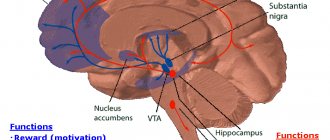An unusual and little-studied psychological disorder—Munchausen syndrome—was talked about again after the release of the series “Sharp Objects” [you can watch it on the Amediateka service]. His heroine - the classic "Munchausen" - literally healed healthy children by inventing diseases for them. Manifestations of the syndrome are often reflected in popular culture (literary works, films), but in real life only isolated cases are known. According to a 1990 study by members of the Department of Psychiatry at the University of Toronto, people with Munchausen syndrome account for approximately 0.2–1.3% of all mentally ill patients. Researchers called the syndrome rare and its danger underestimated.
What kind of syndrome is this, is it widespread in Russia, how do people live with it and what psychiatrists say about it - in the material “Such Cases”.
General information
Munchausen syndrome is a feigning artificially demonstrative mental personality disorder . It is expressed in the desire or incomprehensible unexplained motivation to exaggerately portray and simulate, sometimes even artificially induce various symptoms of diseases and signs of disability in order to be medically examined, subjected to hospitalization and treatment, up to the appointment of surgical interventions, complex procedures, etc. The main goal of patients is receiving attention and support, while they are convincing, their actions are as believable as possible and inspire confidence. The pathology can be considered as a type of hypochondria .
It is believed that people develop pathological behavior and feign illness in order to receive care, attention from loved ones, compassion, possibly sympathy and moral support, which they most often lack in their normal lives. The disease is severe and chronic, more often observed in young girls and women, in whom it is painful and multi-symptomatic.
The pathology is named after the German baron Carl Friedrich Hieronymus von Munchausen, who became famous for stories about his imaginary incredible feats, the term was proposed by R. Escher in 1951, who noticed in the patients examined the behavior and tendency to invent painful symptoms of a physical or psychological nature.
Ganser syndrome
This syndrome is reminiscent of Munchausen syndrome, since a person’s internal anxiety is transformed into demonstrative, defiant, inappropriate behavior that is directed at others. Another name for it is hysterical psychosis. It was first described by the German psychiatrist Ganser in a person who was under investigation. The disorder is still more common when something threatens a person’s social status—for example, a trial. But this could be mobilization into the active army, or even a sudden break in relations.
With this syndrome, a person behaves like a child - sits on the floor, “plays” with surrounding objects. Answers simple questions incorrectly (for example, confuses left and right), cannot get dressed, forgets how to eat. What’s strange is that a person understands speech addressed to him, but says or does everything as if “by.”
Sometimes it gets to the point of “running wild” - a person gets on all fours, laps up water from a bowl, barks, howls and tries to bite people around him.
After an attack, a person does not remember what happened to him. This syndrome is incredibly rare. It is almost never mentioned in movies or feature films. On the other hand, maybe we just have a bad idea of what happens to a person facing prison.
Pathogenesis
Disturbances in Munchausen syndrome are behavioral, and they are not caused by external factors and are not logically motivated, for example, the disease is feigned in order to obtain a benefit, gain, or avoid punishment. Self-harm, the desire to receive care and attention are dictated not by consciousness and logic, but by emotions, neurosis , obsession , fear of loneliness, the desire to avoid responsibility, to be more significant, etc. Patients have a constant and irresistible desire to be examined, operated on, undergo various procedures and treatments, and feel superior to medical workers. Such people are also called “professional patients” and they like to play the role of a patient.
It all starts with the fact that they go to hospitals and talk about their fictitious diseases, if nothing can be found, then they begin to fake tests and symptoms, carefully collect a “medical history”, and then they can even go as far as self-harm, which is most often observed pathomimia is self-damage to the skin, especially if all other methods of simulation are impossible. In addition, iatrogenic consequences occur, allowing people to get their way and end up hospitalized and requiring care.
Such different liars
A person suffering from Munchausen syndrome is called a malingerer, a fraudster, a “professional patient,” a “hospital flea”... In fact, he has a borderline psychiatric disorder, a form of hysteria. Such people strive to get into the hospital by hook or by crook. Such cravings often arise after a real physical illness, the loss of a loved one, a breakup with a loved one, as a result of loneliness. Previously, it was believed that there were more male Munchausens than females, but today women are ahead here too.
Since most malingerers dream of going under a scalpel, the most common type of syndrome is acute abdominal: “barons”, complaining of severe abdominal pain, require immediate surgery. And especially “gifted” ones so reliably imitate a perforated stomach ulcer that they confuse the doctor: blood tests seem to be normal, but the patient is writhing in pain! Just in case, the surgeon arms himself with a scalpel, and now a fresh scar appears on the malingerer’s stomach - the third, fifth, and maybe tenth in a row. For the sake of the desired surgical intervention, some swallow foreign objects - nails, spoons, forks, medical instruments...
Another type of Munchausen syndrome is hemorrhagic (hysterical bleeding). Patients periodically experience natural, and more often artificially induced, bleeding from various parts of the body. Many use animal blood for dramatization and, through skillful cuts, achieve the impression of natural injuries. These conditions are reminiscent of the “vicarary bleeding” of fanatical Catholic women who, during menstruation, experience blood on their palms and soles, where the nails were driven in during the crucifixion of Jesus.
There is also a neurological type: in imaginary (and suspicious) patients, transient symptoms occur - seizures, paralysis, fainting, unsteadiness of gait, severe headache, loss of sensitivity. Sometimes they even manage to “beg” neurosurgeons to perform complex brain surgery.
The Munchausens instantly adapt to the situation: the necessary symptoms “miraculously” correspond... to the profile of the nearest hospital. It is no wonder that new types of syndrome have appeared: cutaneous (self-damage to the skin up to the appearance of non-healing ulcers), cardiac (imitation of angina pectoris, paroxysmal ventricular fibrillation or myocardial infarction - the so-called hysterical pseudo-infarction, characteristic of patients with borderline mental disorders), pulmonary (simulation of tuberculosis and other diseases of the respiratory system) and a mixed type, including all of the above. The rarest and most casuistic is when, say, a woman in the last stages of pregnancy caused early labor pains by piercing the amniotic sac with a long hat clip. And a malingerer with “acute porphyria” - a hereditary disorder of pigment metabolism - for a long time stole urine for analysis from a patient with a real illness.
Classification
According to the Usher classification, there is acute Munchausen syndrome:
- abdominal , aimed at laparotomy;
- hemorrhagic , occurring when bleeding is demonstrated;
- neurological, including provoking or simulating fainting states and seizures.
In addition to true Munchausen's disease with extreme and long-term symptoms, there is a type of syndrome by proxy or so-called delegated, when a person creates false symptoms in another person, most often in his children. It is usually classified in relation to the victim as abuse syndrome .
Also, a separate type of disorder is hospital flea syndrome or hospital habitué syndrome, when patients make every effort to stay within the walls of the hospital.
Delegated Munchausen syndrome and Polle syndrome
The delegated type of disorder is usually identified in parents of children or in persons performing their duties, who deliberately cause or provoke symptoms of various diseases in a child or person with disabilities. MSBP personalities (Munchausen Syndrome by Proxy) usually invent them in order to contact a medical institution for help. In most cases, this is done by mothers, but there are cases when this behavior is also found in their spouses, and often they themselves may have habits characteristic of true Munchausen syndrome.
A separate type of pathology in adults is Pollet syndrome , expressed in the form of artificial infliction of illness on a child by parents, substitute persons or his guardians. A striking example and founder of the disease was the mother of Munchausen’s daughter, who stimulated right-sided hemiparesis and imitated the manifestations of diabetes mellitus using overdoses of glucose and acetone , and gave her son Promethazine , which provoked convulsions and disturbances of consciousness. This case was described by D. Burman in 1977.
By choosing ways to create a false illness in children, people suffering from delegated Munchausen syndrome are most often prone to provoking bleeding , seizures, coma , diarrhea , vomiting , poisoning , infections , suffocation , fever , allergies and even sudden infant death. The methods of their reproduction are varied, but are done in such a way as to most likely not leave obvious traces, for example, suffocation with a pillow, a plastic bag, a hand, fingers when applied to a child’s nostrils or by pressing with the whole body, as well as dietary restrictions, the use of various drugs and their overdoses, their damage, failure to provide and lack of timely access to medical care. In some cases, parents and caregivers “may rush in to provide assistance” and care when qualified help has already arrived, in order to appear as life-saving heroes.
Artificially created diseases of children are not only difficult to treat, but also supported by their caregivers. People with delegated Munchausen syndrome can cause irreparable harm, including to the psychological and intellectual state of the person under their care, since they not only act independently, but are also subjected to various health-damaging examinations, therapies, procedures and operations that are life-threatening. The condition of such children can be improved quite simply - by isolating them from mentally ill parents or caregivers, and the sooner this happens, the better, because the mortality statistics for children with abuse syndrome is frightening - 10-30%, approximately 8% of children remain crippled for life.
The most dangerous thing is when you meet health workers with a delegated disorder, since the circle of their potential victims is simply huge. It is very difficult to convince such a person to see a psychotherapist or to prove his guilt, so today scientists are making every effort to develop ways to identify MSBP personalities. In general, you can recognize an adult who deliberately causes harm and suffering to a child or simply a ward by their desire to receive the approval of others, attention, admiration, while they have a small number of close social contacts, they are lonely, educated, and often have basic medical knowledge.
Known cases of the syndrome
One of the most resonant stories about Munchausen syndrome occurred in the UK. London resident Wendy Scott, feigning various illnesses for several years, underwent 42 completely unnecessary surgeries and 600 hospitalizations. The woman so skillfully portrayed all the symptoms of her alleged illnesses that even experienced doctors believed her. Scott managed to recover from the syndrome, which is almost impossible. According to doctors, two factors contributed to her recovery: the fear of death due to severe complications that the woman received after another operation, and the cat, to which she became so attached that she was afraid to leave him. Already healthy, she said that she was abused as a child, and no one paid attention to her at home. The only good memory from that time is hospitalization due to appendicitis and the caring nurse who nursed her then.
Stories about patients with classic Munchausen syndrome do not often become widely known. But the public has heard more often about such a type of disorder as delegated syndrome.
The “by proxy” version of Munchausen syndrome (delegated, by proxy - TD’s note) was first voiced in 1977. This is the most dangerous type of mental disorder. In 2000, Karen Bennett, a doctor in the pediatric department of Kent & Canterbury Hospital, spoke about it in detail. A person with Munchausen syndrome, by proxy, invents diseases not for himself, but for his closest relative - often a child or elderly parents. Patients with delegated syndrome actually mock their “patients”: they cover their mouths with their hands and plug their nostrils to create the effect of suffocation, hold medicine and food in their mouths by force, increase doses of drugs, and administer unnecessary drugs. All this is done in order to create the image of a martyr, an unhappy parent with a sick child in his arms, who sacrificially takes care of him all his life. Delegated Munchausens need praise and encouragement.
Dee Dee Blanchard from Missouri has been making up illnesses for her since the birth of her daughter Gypsy. The child spent his entire childhood in doctors’ offices and underwent many tests that did not confirm a single disease. But Blanchard was sure that her daughter was seriously ill. For example, a woman claimed that due to muscular dystrophy, Gypsy was unable to move independently, so she was driven in a wheelchair. It all ended with the girl, exhausted from treatment for imaginary diseases, killing her mother and receiving a real prison sentence.
Last December, the trial of American Kaylin Bowen-Wright, who almost healed her eight-year-old son to death, took place. Christopher was born completely healthy, but his mother didn't think so. Over the course of 8 years, the boy was hospitalized more than 300 times, he underwent 13 operations, and three times he was on the verge of death due to infection after surgery. The child moved in a wheelchair, breathed with the help of an oxygen mask, and fed through a tube sewn into the esophagus.
Causes
The development of pathology is based on incompletely studied factors, as well as psychological aspects:
- dysfunctional and unhappy marriage;
- state of frustration ;
- cerebral dysfunction;
- having close relationships with medical professionals;
- experience working as a laboratory assistant or being hospitalized for a real illness in childhood;
- negative attitude towards doctors and medical institutions;
- lack of psychological support and attention;
- depression;
- different types of dependencies.
There is an opinion that faking an illness is a way to shift attention to the body and avoid painful emotions and hide the psychological trauma of childhood.
Signs of the syndrome
Recognizing the disease is difficult. It is impossible to do this in a 15-minute appointment with a therapist. Signs appear gradually, they can be identified and analyzed over a certain period of time.
Behavior
Substitution of clinical tests, often using the results of really sick people (relatives, neighbors).
A voluminous patient file, in which there are many conflicting complaints, very little or no completed treatment process. Constant visits to clinics, free and private. Ambulance calls to home are constant.
Wanting to get medical help and care, a person resorts to a variety of ways to get sick.
:
- tries to stay for a long time among a large crowd of obviously sick people (queuing for appointments, walking along the corridors of the hospital).
- deliberately uses household items and dishes of a chronically ill person, usually in his own family.
- deliberately introduces infection into any random wound (a scratch from a cat's claws, a cut, a burn from an iron).
- self-harm or takes high doses of medications.
Nature of complaints
They are general in nature, without specifics, and are very difficult to track.
These are abdominal pain, diarrhea, difficulty breathing, loss of consciousness, dizziness, weakness. The studies carried out do not reveal any symptoms. Often even the initial signs of the disease are absent.
Munchausen syndrome is a disease that should be treated by a psychiatrist.
Symptoms of Munchausen syndrome
The symptoms and clinical picture of psychological disorder and pathological behavior are usually pronounced, and factitious manifestations occupy a central place in the patient's life. It is possible to recognize Munchausen syndrome by refuting fabricated complaints and by such manifestations as:
- a long history of hospitalizations, in which it was found that the symptoms were feigned;
- pseudology or a tendency to pathological lies and writing fantastic stories, which can occur against the background of self-hypnosis;
- aggressiveness and scandalousness in the absence of the expected attention and interest in the symptoms of an imaginary patient;
- selfharm , pathomimia or deliberate self-harm without suicidal intent;
- secretly taking medications;
- frequent changes of doctors, which may be caused by their refusal to treat a non-existent disease.
Important! Do not try to independently prove to people with Munchausen syndrome the falsity of the nature of the manifestation of an imaginary illness; even providing them with evidence of simulation will not produce the desired effect, but will only increase aggression and other symptoms of Munchausen syndrome; in adults, an integrated treatment approach and thoughtful strategy are important.
Most often, people try to simulate hemoptysis , convulsions , myocardial infarction (by increasing creatinine kinase ), Bartter's syndrome , chronic diarrhea , vomiting, etc. Patients can even achieve a diagnosis; they often undergo hospital treatment and carefully collect documents to confirm the simulated pathological condition.
Ways to imitate symptoms of Munchausen syndrome
- falsification of medical records of research results;
- muscle injury, for example, from blows with a wet towel;
- pinching the skin (pathomimia) to create external manifestations of hemorrhagic diathesis ;
- manipulating a thermometer to simulate a fever;
- swallowing small objects helps to achieve various surgical interventions;
- purchasing blood from laboratories and other patients for mixing with feces and saliva, thereby simulating bleeding, the source of which cannot be found during examination;
- secretly taking diuretics and artificially inducing vomiting raises suspicion of Bartter's syndrome;
- the introduction of adrenaline into the bloodstream or urine is a sign of a catecholamine-secreting tumor ;
- self-administration of glucocorticoids mimics conditions such as Cushing's syndrome ;
- taking Levothyroxine allows you to simulate hyperthyroidism ;
- anticoagulants help cause bleeding;
- with the help of insulin secretagogues or insulin , people with Munchausen syndrome imitate a state of hypoglycemia ;
- diluting samples for stool analysis with water or overusing laxatives can simulate chronic diarrhea;
- Taking emetics, such as the herbal medicinal plant ipecac root emetic, can cause uncontrollable and excessive vomiting;
- by injecting egg white into the bladder or adding it to urine samples, patients feign proteinuria ;
- To achieve hematuria , people add blood to urine tests and go to such extremes as special trauma to the urethra and the introduction of foreign bodies.
Is the syndrome common in Russia?
As for Russian practice regarding Munchausen syndrome, there are practically no Russian-language studies on this topic, and there is no accurate data.
“Unfortunately, there are no valid Russian statistics on Munchausen syndrome. There is an international one - and that one is not very accurate,” says an employee of the Moscow Research Institute of Psychiatry, a branch of the Federal State Budgetary Institution National Medical Research Center for Psychiatry named after. V.P. Serbsky and psychiatrist at the Neurocenter clinic Pavel Alfimov. “This is due to the specificity of patients with the syndrome, who rarely come to the attention of psychiatrists.”
One way or another, people with Munchausen syndrome do meet, but they go first of all to surgeons, gastroenterologists, and therapists, the expert says.
“The problem is that the psychiatrist knows little about such cases. General practitioners, to whom the “Munchausens” turn with their fictitious illnesses, do not specifically study this problem. There is not enough information. As a result, such patients can cause unconstructive irritation in the doctor, and conflict arises. It all ends with people packing up and going to another doctor, and if they are offered help from a psychiatrist, they get offended and write complaints,” notes Alfimov.
“At this stage of scientific development, the problem is difficult to solve”
The expert explains that Munchausen syndrome can hardly be called a separate disease, such as diabetes or pneumonia. It is rather a pattern of behavior, a set of characteristic symptoms. Finding a person with the syndrome in its pure form without concomitant psychiatric pathology, for example, a personality disorder or schizophrenia spectrum disorder, says Alfimov. Therefore, it happens that when they come to the attention of psychiatrists, “Munchausens” are treated under other diagnoses.
“At this stage of scientific development, the problem is difficult to solve. In any hospital in any country such patients are found. In general, this syndrome is not a catastrophic health problem, but its variant - Munchausen syndrome by proxy - is a completely different matter. This is a criminal story involving the use of psychological and physical violence against minors,” says Alfimov.
If there are at least international statistics on Munchausen syndrome, then on delegated syndrome there are not even such statistics. “Those patients who reach psychiatrists have a more or less positive prognosis. Otherwise, the prognosis is poor both for the quality of life and for a person’s physical health,” the expert concludes.
In this case, the doctor believes, it is unacceptable to force a person to see a specialist. Most likely, this will be a traumatic event for him. To help, you first need to involve the family - maintain an atmosphere of respect, build boundaries of communication, support, and eliminate aggression.
Tests and diagnostics
There are difficulties in diagnosing true Munchausen syndrome, because the boundaries between factitious psychological disorder, malingering and somatization are blurred. Different conditions for the development of pathology necessitate the search for alternative names for them. To determine factitious disorder, the following criteria are used (source Wikipedia):
- identifying deliberately reproduced feigned symptoms, as well as self-harm to produce fake symptoms;
- implausibility of anamnestic data;
- lack of external motivation and benefits;
- the most important condition is laboratory confirmation of the feigning nature and the absence of the physical, organic nature of the symptoms.
The nosological system used in the USA - DSM-5 , identifies its criteria for Munchausen syndrome:
- identified falsification of psychological or physical symptoms and signs;
- in a person's understanding he is sick, weakened or injured;
- a false disease state is caused even in the absence of obvious benefit;
- the feigning state cannot be explained by other mental disorders - delusional or schizotypal .
To identify the fabrication of complaints, analyzes and an objective investigation are carried out to identify inconsistencies between the signs of the disease and the anamnesis data.
In some extremely dangerous cases, a psychiatric examination may be prescribed.
Fregoli syndrome
This syndrome is named after the actor Leopold Fregoli, who knew how to masterfully change his appearance. A person with this unusual mental disorder is convinced that his acquaintance (usually a persecutor, enemy, ill-wisher) is hiding in other people - he simply wants to remain unrecognized. Therefore, he constantly changes his appearance and puts on makeup.
Still from the film "The Matrix: Revolution"
This syndrome is a type of Capgras syndrome, in which everything is the other way around - a person is sure that his loved one, for example, his wife or child, was replaced by a double who skillfully faked his appearance and manners. This syndrome was well captured in the (scary) movie Invasion of the Body Snatchers.
Diet for Munchausen syndrome
Diet on vegetables and fruits
- Efficiency: 3-4 kg in 7 days
- Lead time: 3-7 days
- Cost of products: 1200-1300 rubles. in Week
The key to success in eliminating psychogenic forms of pathological conditions is a healthy lifestyle. This includes hobbies, physical activity, building healthy close social connections, and eating a healthy, balanced and varied diet. It’s good if the patient makes it a habit to prepare tasty and healthy food for himself, which will delight him and motivate him to be healthy, work and develop. There are many healthy eating plans and they are all built on a balance of protein, fat and carbohydrates. The main thing to remember is:
- pamper yourself with seasonal fruits and vegetables;
- prepare food by boiling, baking, stewing, cooking in a double boiler or multicooker;
- consume high-quality farm meat, eggs and dairy products;
- build the carbohydrate part of the diet on cereals and whole grains;
- minimize simple carbohydrates and caffeine;
- maintain water balance with clean water, herbal and other teas, natural fruit drinks, compotes and juices.
Difference from hypochondria
It is often confused with hypochondria.
These two conditions are indeed similar, but they have different causes. What are the differences? Hypochondria is the discovery of symptoms of various diseases that you have heard about from friends or read about. Feeling afraid, a person goes to the hospital, and after tests and studies are carried out, he is relieved to hear from the doctor that he does not have any illness.
True, after a while he may discover something else in himself and a visit to the doctor will follow again. This is the difference: a hypochondriac is afraid of getting sick, and a person suffering from Munchausen syndrome wants to get sick. All medical students go through a mild form of hypochondria when lectures on the topic: Internal diseases begin.
Diagnostics
It is quite difficult to determine pathology, since “professional patients” can describe all the symptoms of the disease so reliably that sometimes, thanks to self-hypnosis, they actually feel pain for no reason.
To make a diagnosis, the doctor must interview and examine the patient, and then send the patient for the necessary studies. If no somatic disease has been identified, then the patient is diagnosed with Munchausen syndrome and sent for consultation to a psychiatrist.
A little history
Munchausen syndrome was first described by Dr. Richard Asher in 1951 in a patient obsessed with treatment. The name was given in honor of the great dreamer of the German Baron Munchausen, who became a hero of literature thanks to his phenomenal abilities for invention. This is exactly what distinguishes all patients with this syndrome. In their irrepressible desire to be treated, they resort to such sophisticated tricks that are not always recognized by medical staff. As a result of this, patients with Munchausen syndrome end up in a hospital bed, having achieved what they wanted, and sometimes on the operating (!) table. In medical practice, a case of Munchausen syndrome is described, when the patient ended up on the operating table 40 times, without needing any surgical intervention at all (she was so talented at simulating the symptoms necessary for this).
Examples, cases from life
Real-life examples of Munchausen Syndrome are terrifying.
A middle-aged man comes to the hospital emergency room regularly, once a week. He looks mournful, he moans deliberately, holds his stomach, complains of unbearable pain, begs the doctors to help him, threatens to die right here on the steps. Clearly and figuratively describes the picture of a perforated gastric ulcer. He lists all the necessary symptoms and demands that he be immediately taken to the operating room. He doesn’t want to talk to the psychiatrist he called, he starts threatening the city health department, the regional health department, the ministry, and then all the way up to the president. This patient has been known well for a long time.
A vivid illustration of one of the cases of Munchausen syndrome. Those brought to intensive care with symptoms of severe poisoning, which was intentional, are most often included in the category of suicides. There are cases where quite severe self-injuries were deliberately inflicted, even penetrating into the abdominal cavity, for one purpose: to receive the much-desired attention, care, to feel that the whole world revolves around you. Perhaps this behavior is not suicide at all, but the first manifestation of the symptoms of Munchausen syndrome.
- The story of a British woman already known throughout the world Wendy Scott
. She underwent forty-two abdominal operations, which she did not need at all. This is also an example of blooming Munchausen syndrome. Over the course of twelve years, she visited an unimaginable number of hospitals - about six hundred.Having been refused one, she immediately applied to another. She shared in an interview that she felt happy only in the hospital. Having survived such a record number of surgical interventions, Wendy died from real and fleeting cancer.
But the worst damage is done to children...
- Boy named Garnett Spears
died at the age of five in intensive care from sodium poisoning, which led to cerebral edema. A year later, his mother, Lacey Spears, was charged with murder. She poured a saturated saline solution into the gastrostomy tube.The boy had been suffering for several years from many diseases that were invented and artificially created by his loving mother, which she enthusiastically told all her relatives and friends about and described on her page on the Internet. Lacey Spears was sentenced to twenty-five years in prison for the murder of her son.
- Marybeth Tinning
, a poorly educated, narrow-minded, obviously sick woman began to reproduce in her early youth, giving birth to a child every year. The police paid attention to it only after nine lost babies, who died with enviable regularity from the rarest disorders and diseases on the planet.As a result of numerous complex examinations and difficult trials, she was accused of the death of one child and sentenced to a twenty-year prison term. And most importantly, no one could understand why it was necessary to give birth to so many children in order to bring them to death within a short time. Most likely, the reason is delegated Munchausen syndrome. A savage way to evoke sympathy and compassion.
- Gypsy Rose Blanchard
. At the age of seven she suffered a minor injury. But her mother, Clauddine, decided that this was a sign of more serious, deeper injuries and the girl needed to undergo several serious operations. So Gypsy ended up in a wheelchair. She stopped attending school, switching to home schooling, which was justified by illness. Her parents divorced. Soon, trips to the hospital became regular; Jpsy’s mother voiced her daughter’s vision and hearing problems and seizures. An anticonvulsant was prescribed. Several operations were performed.The strongest hurricane Katrina left a daughter and mother without a roof over their heads. They moved to another state. The Fund for Helping Sick Children helped with the move, paid for the rent of the house, and subsequently a small house was built specially for them, equipped with a ramp and a jacuzzi. Just at this time, the family came to the attention of the press: a single mother, an immobile daughter in a wheelchair, damage from a hurricane.
The efforts of journalists contributed to the fact that a huge number of people began to support the unfortunate people. Charitable contributions, trips to entertainment events, and free flights for consultations with famous doctors poured in. The girl's father regularly paid child support, but Claudine did not allow him to see his daughter, making excuses by hook or by crook. Gypsy looked deplorable: a thin childish voice, missing teeth, glasses with strong diopters.
Her mother insisted that she was mentally retarded. One of the many diagnoses was cancer, the treatment of which resulted in almost complete baldness. The girl did not leave the house without oxygen cylinders and a feeding tube. Claudine was an example of a reverent and caring mother: she did not leave her daughter’s side, sewed funny wigs for her to hide her baldness, and was constantly on the lookout for new doctors. It seemed that Gypsy was alive only through the efforts of her mother.
Everything turned upside down one day when Gypsy's mother, Clauddine, was found murdered in her home. After a hasty and frantic investigation, Gypsy was discovered in a neighboring state, in company with a young man, firmly standing on both legs. She didn't need a wheelchair. There was none of all the terrible diagnoses attributed to her. Even mental retardation. Her mother, Clauddine, had delegated Munchausen syndrome.









